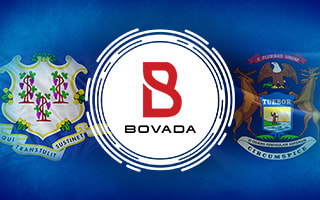Bovada Stirs Trouble as Legal Gambling Market Settles
 When online gambling sits in a gray area in terms of legality, unlicensed gambling platforms like Bovada have a chance to thrive. The platform is considered one of the major “black-market” operators thanks to its online offerings of sports betting.
When online gambling sits in a gray area in terms of legality, unlicensed gambling platforms like Bovada have a chance to thrive. The platform is considered one of the major “black-market” operators thanks to its online offerings of sports betting.
While sports betting is not legal in every state, those that have clearly made it legal or illegal retain the right to shut down unlicensed betting. This is exactly what is happening with Bovada, an online operator based in Curaçao, which is now banned by five different US states.
Federal Interventions in the Past
Michigan and Connecticut are the next in line to challenge this pervasive online sportsbook, taking cues from previous legal cases. For example, in 2011 the federal government went after Poker Stars (which existed in its first, unlicensed iteration) and successfully shut down its operations across the country.
It was a big year for such cases, as the DoJ also made its mark by fighting the sportsbook 5Dimes, which was based in Costa Rica and also active in the US. The DoJ ultimately settled with the company’s CEO, Laura Varela.
Michigan’s Fight
The Michigan Gaming Control Board (MGCB) started its battle by sending a cease-and-desist letter to Bovada in May of this year. The letter offered the company two weeks to end its operations in the state.
MGCB cited the Lawful Internet Gaming Act, the Michigan Gaming Control and Revenue Act, and multiple other points in the state’s penal code as legal areas that the company had violated.
Using these as leverage, MGCB threatened to take Bovada to court if they continued taking sales in the state.
Brandt Iden, a former state rep who co-created the state’s online gaming law, spoke about the situation bluntly on a podcast recently, stating that he believes MGCB is doing the right thing, and that more legal regulators should follow suit. Iden argued that the legal market will be negatively impacted by illegal players as long as they are allowed to operate. This move could be connected to the recent decrease in gaming revenue in Michigan.
Connecticut in Line
Connecticut is next up in the growing surge against Bovada. Apparently, regulators in the state have similar plans to Michigan’s, but have not sent a cease-and-desist yet.
The states of New Jersey, New York, Maryland, Nevada and Delaware have already banned Bovada’s operations. It is said that a cease-and-desist order is the first step in this kind of battle, but that federal support is necessary to fully achieve the aims of the regulators. It is also vital that the states in question have the laws necessary to back up their claims against black-market companies.
Federal intervention could be of great use, considering how many illegal operators there are across all 50 states. Their work could help make a full-scale effort to eliminate them effectively, whereas working state by state is a slow and tedious process and, unfortunately, not guaranteed to work.
 By Matt Speakman,
By Matt Speakman,

 A Friendly Bet: Michigan Lawmakers Introduce Social Betting Bill
A Friendly Bet: Michigan Lawmakers Introduce Social Betting Bill Drawing the Line: MGCB Warns Sportsbooks Against Prediction Markets
Drawing the Line: MGCB Warns Sportsbooks Against Prediction Markets Sullivan County's $585M Catskills Casino Rescue: Lifeline or Leap of Faith
Sullivan County's $585M Catskills Casino Rescue: Lifeline or Leap of Faith Light & Wonder Announces Plans to Raise $1 Billion
Light & Wonder Announces Plans to Raise $1 Billion The Great Race for NY Casinos
The Great Race for NY Casinos New Jersey DGE Fines Caesars Sportsbook
New Jersey DGE Fines Caesars Sportsbook MGM Prepared to Do Anything to Acquire Entain
MGM Prepared to Do Anything to Acquire Entain Caesars Reveals Plans to Open a Temporary Casino by July Next Year
Caesars Reveals Plans to Open a Temporary Casino by July Next Year Seminole Tribe of Florida Files Replies in the United States Court of Appeals for the District of Columbia
Seminole Tribe of Florida Files Replies in the United States Court of Appeals for the District of Columbia Hollywood Casino Riverboats to Be Moved Inland
Hollywood Casino Riverboats to Be Moved Inland